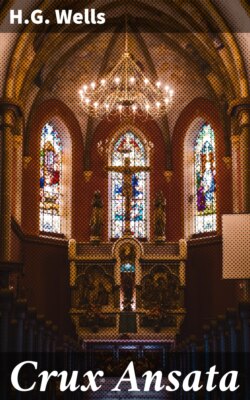Читать книгу Crux Ansata - H.G. Wells - Страница 6
На сайте Литреса книга снята с продажи.
III. — THE ESSENTIAL WEAKNESS OF CHRISTENDOM
ОглавлениеTable of Contents
AND first among the things that confront the student is the intermittence of the efforts of the Church to establish the world-City of God. The policy of the Church was not whole-heartedly and continuously set upon that end. Only now and then some fine personality or some group of fine personalities dominated it in that direction. "The fatherhood of God" that Jesus of Nazareth preached was overlaid almost from the beginning by the doctrines and ceremonial traditions of an earlier age, and of an intellectually inferior type. Christianity early ceased to be purely prophetic and creative. It entangled itself with archaic traditions of human sacrifice, with Mithraic blood-cleansing, with priestcraft as ancient as human society, and with elaborate doctrines about the structure of the divinity. The gory entrail-searching forefinger of the Etruscan pontifex maximus presently overshadowed the teachings of Jesus of Nazareth; the mental complexity of the Alexandrian Greek entangled them. In the jangle of these incompatibles the Church, trying desperately to get on with its unifying task, became dogmatic and resorted to arbitrary authority.
Its priests and bishops were more and more men moulded to creeds and dogmas and set procedures; by the time they became popes they were usually oldish men, habituated to a politic struggle for immediate ends and no longer capable of worldwide views. They had forgotten about the Fatherhood of God; they wanted to see the power of the Church, which was their own power, dominating men's lives. It 'was just because many of them probably doubted secretly of the entire soundness of their vast and elaborate doctrinal fabric that they would brook no discussion of it. They were intolerant of doubts and questions, not because they were sure of their faith, but because they were not. The unsatisfied hunger of intelligent men for essential truth seemed to promise nothing but perpetual divergence.
As the solidarity and dogmatism of the Church hardened, it sloughed off and persecuted heretical bodies and individuals with increasing energy. The credulous, naive and worthy Abbot Guibert of Nogent-sous-Coucy, in his priceless autobiography, gives us the state of affairs in the eleventh century, and reveals how varied and abundant were both the internal and external revolts against the hardening authoritarianism that Hildebrand had implemented.
Abbot Guibert himself is an incipient internal rebel with criticisms of episcopal and papal corruption that already anticipate the Lollards and Luther, and the stories he tells of devils diabolical possession and infidel death-beds, witness to the wide prevalence of scoffing in Christendom even at that early time.
Yet Abbot Guibert, albeit a potential Protestant, was as completely tied to the Catholic Church as we are all tied by gravitation to the earth. There was as yet no means of breaking away. The formulae of separation had still to be discovered. Scoffers might scoff, but they came to heel on the death-bed. Four long centuries of mental travail had to intervene before these ties were broken.
But by the thirteenth century the Church had become morbidly anxious about the gnawing doubts that might presently lay the whole structure of its pretensions in ruins. It was hunting everywhere for heretics, as timid old ladies are said to look under beds and in cupboards. before retiring for the night.
